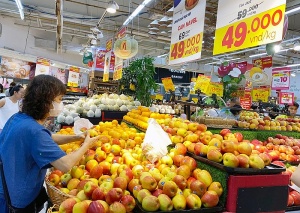Rapid developments changing the game in FMCG
Bain Capital completed a $250 million investment in Masan on April 22, and Nestlé has made another $100 million investment in the southern province of Dong Nai. What drives this trend of FMCG manufacturers stepping up their activities in Vietnam?
 |
| Peter Christou, general manager of the Vietnam Worldpanel Division at Kantar |
The recent surge in investments by international FMCG giants in Vietnam is a clear sign of confidence in the country’s long-term potential. It reflects Vietnam’s emergence as a booming global consumer market and a strategic manufacturing hub.
Vietnam boasts impressive economic growth projections, with New World Wealth forecasting Vietnam will achieve a staggering 125 per cent increase in wealth, the fastest growth in the world, within the next decade. HSBC predicts Vietnam will become the 11th largest consumer market in the world by 2030 with 80 million potential consumers.
This translates to a burgeoning middle class with rising disposable income, creating a vast pool of new consumers hungry for diverse FMCG products. This influx of investment also signifies a focus on innovation. With a diverse and increasingly sophisticated consumer base in Vietnam, different age clusters have evolving demands for FMCG products. They expect more choices and better quality, providing a fertile playground for global and domestic manufacturers to innovate and grow by serving more consumer needs.
How do you evaluate the competitive landscape of Vietnam’s FMCG market this year?
Vietnam’s dynamic FMCG landscape is driven by several factors, creating an exciting playground for both established players and newcomers.
The past few years have witnessed the rise of small and local brands. In a price-sensitive environment, Vietnamese consumers are increasingly drawn to small, local brands that cater to local preferences, source ingredients locally and often provide better value for money.
Secondly, consumers in Vietnam are becoming increasingly price sensitive and savvier shoppers. Rising awareness and the ability to compare prices across channels, thanks to the internet, have created a competition for the most competitive offers. Promotions and deals become a crucial component in shoppers’ decision-making process, pushing both local and international brands to offer attractive pricing strategies.
Beyond price, consumers are also demanding more information about product quality, ingredients, and sustainability practices. This trend necessitates transparent communication and a focus on building trust with consumers.
Furthermore, the rapid development of e-commerce and logistics are further changing the game. Consumers now have access to a wider pool of products from both domestic and international brands on various channels, expanding their choices exponentially. This not only intensifies competition but also creates opportunities for new and niche players with differentiated offerings.
The intense competition in Vietnam’s FMCG market is ultimately a positive development. It drives innovation, benefits consumers with more choices and valuable information, and pushes the industry to meet consumers’ evolving demands.
How do you see the shifts in consumer purchasing behaviour affecting grocery retailers and FMCG companies?
The evolving purchasing behaviour of Vietnamese consumers is presenting both challenges and opportunities. Kantar’s latest consumer confidence survey shows a decline in consumer confidence in 2023 compared to the post-pandemic high of 2022, settling at levels comparable to 2021, the year the pandemic hit the hardest.
Fuelled by the lingering effects of economic uncertainties, consumers are making careful purchase decisions and increasingly prioritising high-quality products at affordable prices. The behaviour of meticulously comparing prices, deals, and seeking value for money across channels is here to stay and likely becoming part of Vietnamese shopping mindsets.
On the other hand, rising incomes and greater exposure to products are creating a more sophisticated consumer base. Particularly, younger shoppers are driving a demand for personalisation. This fosters a fragmented market with a wider range of consumer segments with specific needs. FMCG companies need to cater to this complexity by offering targeted products and messaging.
To win over today’s value-conscious Vietnamese shopper, FMCG brands need to not only offer quality at affordable prices but understand what drives their purchases – convenience, quality, or specific needs – by leveraging consumer behaviour insights. They also need to ensure their products are available in the right channels, so shoppers can easily find what they’re looking for.
Retailers also need to understand the changing shopping habits to stay relevant, as well as retain and acquire more shoppers. Kantar’s in-home FMCG purchase data shows that shoppers are making fewer shopping trips overall, but when they do venture out, they visit more stores on average. Retailers are essentially competing for less customer footfall, which raises the importance of enhancing the shopping experience and maximising the value of each customer visit.
What are the growth prospects for Vietnam’s FMCG market?
The Vietnamese FMCG market presents exciting growth prospects, with some caution. While overall economic growth projections remain positive, lingering economic uncertainties from 2023 require a nuanced approach. Rural areas present a potential source of growth for FMCG brands as we see a penetration gap across most categories between urban and rural markets, suggesting there’s headroom for brands to gain more rural buyers. Many categories and modern trade channels primarily popular in urban areas are now making their way to rural consumers.
This presents a significant opportunity for companies to expand their reach and acquire a vast new consumer base.
 | Vietnam's FMCG market suffers turbulent year Ongoing unfavourable global and internal economic conditions made an impact on Vietnam's fast-moving consumer goods (FMCG) market and consumer confidence, according to a report released by Kantar Worldpanel Vietnam on February 5. |
 | 2024 is expected to see fiercer competition in FMCG As competition intensifies in the fast-moving consumer goods (FMCG) playground in 2024, the urgent need for brands to identify their unique growth drivers to stay ahead of competition has been highlighted. |
What the stars mean:
★ Poor ★ ★ Promising ★★★ Good ★★★★ Very good ★★★★★ Exceptional
Related Contents
Latest News
More News
- Masan Consumer names new deputy CEO to drive foods and beverages growth (February 23, 2026 | 20:52)
- Myriad risks ahead, but ones Vietnam can confront (February 20, 2026 | 15:02)
- Vietnam making the leap into AI and semiconductors (February 20, 2026 | 09:37)
- Funding must be activated for semiconductor success (February 20, 2026 | 09:20)
- Resilience as new benchmark for smarter infrastructure (February 19, 2026 | 20:35)
- A golden time to shine within ASEAN (February 19, 2026 | 20:22)
- Vietnam’s pivotal year for advancing sustainability (February 19, 2026 | 08:44)
- Strengthening the core role of industry and trade (February 19, 2026 | 08:35)
- Future orientations for healthcare improvements (February 19, 2026 | 08:29)
- Infrastructure orientations suitable for a new chapter (February 19, 2026 | 08:15)

 Tag:
Tag:



















 Mobile Version
Mobile Version